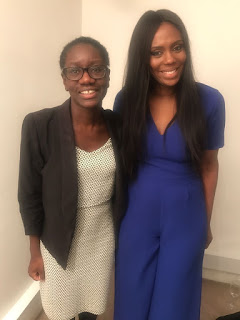Dakan: the ultimate love story
I know of three films produced by
Guinean Mohamed Camara – each of which tackle the taboo subjects of incest and child
suicide from an African perspective. Dakan (meaning destiny) is his third, which I watched at South London
Gallery as part of Film Africa 2014, and it did not disappoint.
 |
| Camara's film Dakan shows that love endures
© Film Africa 2014
|
The opening scene is arresting. Two
lovers in passionate embrace, lips locked and gripped by desire. The pair are in
a red car – the colour of passion – enveloped by darkness except for a chink of
light. We only see one face, the other is hidden, forcing us to focus on the
intimacy and not the gender. It is only when the camera draws nearer
that we realise that they are BOTH men.
Brave. Brave. Brave! At this point in
the film I was giving Camara a mental standing ovation.
Pushing boundaries
Dakan is thought to be the first gay film from West Africa and premiered at the 1997 Cannes Film Festival. It is also a film that came to be against all odds. Fellow filmmaker Joseph Adesunloye told us viewers that the film started out with support from the Guinean government. But once it became clear that this was a gay love story, that funding was withdrawn and public protests started to emerge. But Camara carried on regardless.
Dakan is thought to be the first gay film from West Africa and premiered at the 1997 Cannes Film Festival. It is also a film that came to be against all odds. Fellow filmmaker Joseph Adesunloye told us viewers that the film started out with support from the Guinean government. But once it became clear that this was a gay love story, that funding was withdrawn and public protests started to emerge. But Camara carried on regardless.
And thank God he did because this film is as true a love story
as the well-worn Shakespearian 'Romeo and Juliet' but without the awful deaths.
Romeo and Romeo
Sori is from a well-to-do family. His father owns a fishing business and fought his way, through hard work, out of the village, while Manga’s family is poorer. Camara captures this antithesis through his application of light. Scenes depicting Manga’s home life are dimly lit; Sori’s relative wealth is captured in brighter scenes.
Sori is from a well-to-do family. His father owns a fishing business and fought his way, through hard work, out of the village, while Manga’s family is poorer. Camara captures this antithesis through his application of light. Scenes depicting Manga’s home life are dimly lit; Sori’s relative wealth is captured in brighter scenes.
We watch on as these teenagers navigate
through life’s hurdles, dealing with the burden of expectation from being an
African child. For many of us that has meant towing the line, and not
challenging our elders because we are supposed to make them look good.
I loved the way Camara tackles this
issue. Both Sori and Manga’s parents know they are in love. But both parents
refuse to accept this. So much comedy runs through the film – surprisingly
– considering the subject matter.
One classic scene that made me chuckle was when Sori announces to his dad (a highly respected member of the community) that he is in love with Manga. His dad responds by turning up the volume on the TV!!!!
One classic scene that made me chuckle was when Sori announces to his dad (a highly respected member of the community) that he is in love with Manga. His dad responds by turning up the volume on the TV!!!!
For me, this film may be about gay love
but the message is universal. It’s about love full stop. It is about a mother’s
love for her son that she would risk her life to make his “well”.
It is about a son’s love for his mother that he turns his back on his true love to try in vain to love a woman. But most of all, it’s about love’s endurance to survive against all odds. And this is exactly what Dakan - the story - and Dakan as a ground-breaking film does.
By Kirsty Osei-Bempong
For more film blogs, check
Belle - a new kind of English rose
Gold Coast: a lucid look into Denmark's colonial past
Review of N: The Madness of Reason - a Film Africa London Premiere
All comments are welcome on this page. If you are having trouble posting on the Google+ page, please share your views via Facebook here or tweet @MisBeee
Please be aware that you may not reproduce, republish, modify or commercially exploit this content without our prior written consent.
It is about a son’s love for his mother that he turns his back on his true love to try in vain to love a woman. But most of all, it’s about love’s endurance to survive against all odds. And this is exactly what Dakan - the story - and Dakan as a ground-breaking film does.
By Kirsty Osei-Bempong
For more film blogs, check
Belle - a new kind of English rose
Gold Coast: a lucid look into Denmark's colonial past
Review of N: The Madness of Reason - a Film Africa London Premiere
All comments are welcome on this page. If you are having trouble posting on the Google+ page, please share your views via Facebook here or tweet @MisBeee
Please be aware that you may not reproduce, republish, modify or commercially exploit this content without our prior written consent.





Comments
Post a Comment